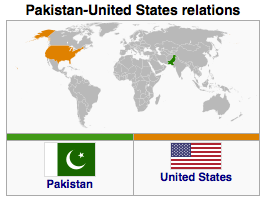US Aid To Pakistan: A Reality Or Delusion? – OpEd
By Zara Gul
As a consequence of the September 11 attacks, the International Security Assistance Force (ISAF) was set up as an action force for security interventions in Afghanistan, particularly to eliminate Osama’s Al Qaeda and Omar’s Taliban from the country. This task was taken up to ensure that Afghanistan would never become a sanctuary for terrorists again.
The ISAF was a resolution of the United Nations Security Council (UNSC) but ironically, no record warrants the involvement of NATO in Afghanistan to be a part of any resolution, or action, of the UNSC. With immediate effect in 2003, NATO took over the command from the ISAF and now heads the operations in Afghanistan, much to the surprise of the world community.

After making its way into Afghanistan, NATO’s primary objective was to create supply routes for the transfer of weapons and other goods. They succeeded in luring Pakistan to act as a conduit for its arms and ammunition supply. The fact of Pakistan not being a land locked state provided an efficient supply route for the NATO supply and transit both on air and through ground. Secondly, Pakistan was also known for succumbing under Western, and especially US, pressure so it gleefully gave in to the NATO demands and penned down a long term contract for NATO supply through Frontier Region of Pakistan.
Musharraf, the then military dictator, allowed access to open these supply routes and his decision had two major implications for Pakistan. First and foremost, Musharraf succeeded in gaining legitimacy and support for his regime from the US and its Western allies. Secondly, the move brought about almost perpetual chaos in the country.
Having opened in 2001, these routes remained closed for a week in 2010 when NATO aircrafts killed Pakistani soldiers. An estimated 35,000 innocent Pakistanis have been killed, excluding 40,000 who were severely injured, between 2004 and 2010. The ties saw another vicious downturn when on November 26, 2011, the NATO forces attacked the Pakistani Salala checkpost in the border region. This act of aggression resulted in strong protest from the Pakistani government leading to evacuation orders of the Shamsi Air Base, used by the ISAF, as well as suspension of the NATO supply route. This suspension brought a high degree of criticism for Pakistan from the international community, though recently both the governments reached a mutual agreement and reopened the routes, as was expected by most of the Pakistanis.
Taking a peek in the past, the US has repeatedly used Pakistan merely for its personal interests using financial aid to depict that the country is helping its ally, Pakistan, to come out of the adverse economic constraints for the good of its people. To our misfortune, the US aid has become a drug for Pakistan’s leaders. Of course, the Pak-US relations have been adversely affected after the devastating debacle of November 26, 2011.
Following international regulations, Afghanistan can take the help of any neighboring country that has access to the sea, such as Pakistan, in order to supply goods to other countries. But these rules do not apply to weapons and artillery. Pakistan’s suspension of NATO supply routes does not in any way come into conflict with the trade treaty it signed with Afghanistan in 2010. Neither does it break the agreement of transit trade between the land-locked states.
Pakistan really needs to cogitate on whether the transit of weapons should be allowed even after these same weapons have been used against Pakistani soldiers and citizens time and again. The US finds it very simple to sweet-talk Pakistani leaders into giving them the liberty to interfere in Pakistan’s internal affairs. But Pakistan should not become a submissive servant for the US. This current situation has led to the insecurity and misery of the Pakistani citizens throughout the country. This is the goal the anti-Pakistan forces are trying to achieve.
It is high time Pakistan starts dealing with the major issues on its own as an independent and sovereign State. Pakistanis need to give thought to this scenario and rise together with distinction instead of helplessly relying on the US to come and assist with their so-called financial aid while they plot against our country at the same time.
The author is an engineering student from Islamabad, having interests in Politics and International Affairs.

There is no concrete point that the writer makes related to the tile of her article. True lots of things are wrong with this relationship and Pakistan is to blame for what has happened over the past 63 years. It would be hard to realize the circumtances which made Pakistan policy makers, if there were any, why they took this path, how we can get out of this arrangement now is a million dollar question or can we.
Countries with set goals and foresight have multiple friends and virtually no foes, in case of Pakistan it has India and Afghanistan who claim of a bad neighbor, to the contrary you cannot prove that they have done wrong, however that may be true. When you are weak and not clear headed, abet to create chaos in your neighboring countries you are bound to fail.
of course there is a concrete point when the writer raises concerns about nature of trade ties between India, Pakistan, Afghanistan and the US. Use of trade-pacts to advance military objectives should be condemned by all those who support peace and inter-regional harmony.